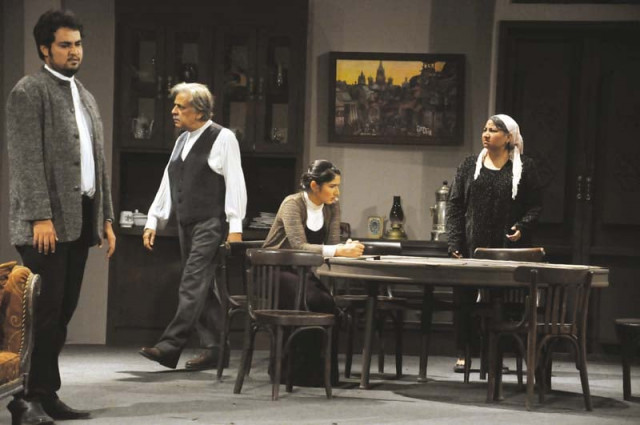Up against a crumbling wall
‘Dhaiti Deewarain’ may be based in Russia but its depiction of domestic strife will give you a rush of blood

Gorky uses the Vassily household as a metaphor for his critique on contemporary Russian society, which is straining at the seams. PHOTOS: PUBLICITY
“Your children are not your children. They are the sons and daughters of life’s longing for itself. They come through you but not from you. And though they are with you, yet they belong not to you. You may give them your love but not your thoughts. For they have their own thoughts.” These lines by Lebanese-American writer Khalil Gibran, from his masterpiece The Prophet, flashed in mind Thursday evening, while watching an adaptation of Russian playwright Maxim Gorky’s pre-revolutionary play Philistines at the National Academy of Performing Arts (Napa).
Directed by the legendary Zia Mohyeddin, Dhaiti Deewarain is the story of a generational clash in a petit bourgeois Russian household. The family’s authoritarian patriarch, Vassily Vich, played by Khalid Ahmed, tries to dictate the lives of his adult children, son Pyotr (Ali Rizvi), adopted son Nil (Paaras Masroor), and daughter Tanya (Shabana Hassan), expecting unquestionable compliance from them. However, they refuse to submit to their father’s hackneyed, conservative and conformist thoughts.
In the faint glow of oil lamps, the audience is introduced to Tanya, a schoolteacher, who reads a novel as she reclines on a couch. Polya (Maha Ali), a servant and daughter of bird-catcher Perchikin (Meesam Naqvi), discusses literature and how it would feel to meet the writer, but Tanya tells her that the writer died long ago. Tanya is filled with boredom and pessimism, which are exasperated by an unrequited love and perennial conflict at home.

Soon, Pyotr joins them on the stage. He was expelled from a Moscow law school for his “rebellious political views.” The change-seeking Pyotr’s flippant disdain for the old order is such that he harangues a cupboard and its contents for being there for long. At this point, Vassily makes his first appearance on the stage and then on, the friction between him and his children becomes a recurrent aspect of the play, symbolising the dichotomy between the old and new order.
Apart from the Vassily family, there are two tenants in the lodge. Teterev, a drunkard chorister-cum-philosopher, is laudably justified by actor Nazarul Hasan. With his well-timed humour and commentary on social constructs, he provides ample comic relief throughout the play. At one point, he says about life, “People shout, fight, eat and go to bed. When they wake up, they start shouting again.” This perfectly sums up the Vassily house and perhaps, the play itself. Polya’s father, played by Naqvi, appears in a couple of scenes. He is always drunk but makes some interesting anecdotal commentaries on the society, using metaphors of birds.

Gorky uses the Vassily household as a metaphor for his critique on contemporary Russian society, which is straining at the seams. Corruption is rampant in the bureaucracy which, in turn, gnaws at the state’s legitimacy, while an impoverished working class questions the socio-economic disparity. In short, Gorky shows that Russia is ripe for a revolution and Mohyeddin makes it relevant with ease, without even changing the names and places in the story. He garnishes Gorki’s exploration of relations that hold a family structure together, such as the father-son and mother-daughter relationships, with a high quotient of melodrama, which in turn enhances the cathartic experience for an audience that is used to watching television serials. Dhaiti Deewarain, however, is way ahead of the portrayal of melodrama in Pakistan, be it on stage, TV or film. It’s the closest you can get to the reality.
Where Maqbool Ahmad’s well-devised set takes you back to Russia, the characters look formally informal in their quintessential early 20th-century costumes, designed by Azmi Sabeen and Irum Bashir. The performances were so riveting yet unsentimental that the play, despite being a bit long, didn’t drag. Vassily’s nostalgia, foreboding concern for his children’s future and attempts to assert his authority made him a dislikeable, petty tyrant in the house. Khalid’s character was so convincing that it seemed that a point would come when the audience would start hating him instead of his character.
To sum it up, the attention Mohyeddin pays to details and diction makes Dhaiti Deevarain a real treat to watch, especially for connoisseurs of literature. Although written in 1901, the play’s context is hardly farfetched. It tells the predicament of the young generation, which the older generation, such as Gorky’s Vassily, wants to follow in their footsteps. This approach, however, is impractical and unrealistic as Khalil Gibran said, “You may strive to be like them [your children], but seek not to make them like you. For life goes not backwards nor tarries with yesterday.”
Verdict: Mohyeddin makes the 1901-play relevant with ease. The attention-to- detail and diction makes Dhaiti Deevarain a real treat to watch, especially for connoisseurs of literature.

Published in The Express Tribune, May 16th, 2015.
Like Life & Style on Facebook, follow @ETLifeandStyle on Twitter for the latest in fashion, gossip and entertainment.



















COMMENTS
Comments are moderated and generally will be posted if they are on-topic and not abusive.
For more information, please see our Comments FAQ